When John Met Sarah Read online
Z-Apoc
Part I: When John Met Sarah
Joe Ducie
Z-Apoc (Part I) Copyright© 2012 by Joe Ducie.
The Author retains the copyright to this story.
Book design by Joe Ducie.
All rights reserved.
This is a work of fiction. No part of this book may be reproduced in any form without expressed written permission from the author. For the purposes of review, short excerpts may be quoted.
Visit the writer’s website: Joe Ducie
Also by Joe Ducie
Novels
Distant Star
Short Stories
Red vs. Blue
The Forgetful Library
Upon Crystal Shores
Z-APOC
I – Baby, I’ve been here before
For John Allen, the end of the world began with a slutty pumpkin.
Looking back a year to the day, he found it almost prophetically funny that he’d been dressed as one of the dead that Halloween night.
As a walker.
The soulless.
A biter.
Call them what you will, John had been dressed to impress. His zombie makeup, torn clothes, and yellow contact lenses had swept Holly Beckett, the slutty pumpkin from some sitcom, off her feet and into the backseat of his ’87 Astra. The logistics of the pumpkin costume had almost foiled any foreplay, but John had persevered, as lads thinking with their dick are wont to do.
That’s the last good thing that happened to me, John thought, shifting into third on the Pacific Highway, as dawn crept over the horizon a few hundred clicks north of what had once been Sydney.
He smiled as he thought of Holly, her orange face dashed with pumpkin-seed freckles and a green leafed hat atop her head. As cute as they come, only just sixteen, and a year below him back at Ocean Bay High School. They had laughed, they had fucked, and they had drunk cheap children’s booze, Chateau Cardboard, as Bowie’s Greatest Hits blasted out of the radio.
“You’re a sweet thing, John Allen,” she had whispered, her breath hot against his neck.
A zombie had eaten Holly’s freckled face a day later, as the whole country—and, as far as Haven knew, the world—had torn itself asunder. John, alone and afraid, had buried her under the cherry blossoms south of Dunsborough. Holly clawed her way out of her shallow grave later that night, as he slept nearby in the Astra, and John had killed his first Z—with a tyre iron.
You always remember your first. He snorted, veered around an overturned sheep carrier full of bones, kicked up orange dust in the emergency lane, and jumped up into fourth gear. The road ahead was clear.
John had kept pretty close to the coast this trip to the mainland. The survival business was always touch and go, and what worked for one didn’t always work for another, but he’d found some supplies and encountered very little in the way of hordes near the coast on past trips. Suburbia and the city itself would be a different game entirely, but a year on since the end of the world—and I feel fine—and most outlying towns had zilch in the way of supplies.
These days survivors of Z-Apoc had to suck it up and scavenge nearer to what had once been mass-population centres.
Every ten minutes or so John flicked the stereo in his purple Jeep Cherokee from the CD player over to the AM/FM bands, scanning for a signal. Casey Tully, the comms girl back on Haven, had a theory that if there were still any government or military in New South Wales, they’d be pinging emergency messages off the radio towers in and around Sydney. So far John had heard nothing.
He didn’t expect to hear anything. Mainland belonged to the Z’s.
John flicked back to the Chili Peppers and tapped his hands against the wheel, keeping the beat. He had been driving for near-on seven hours, down from the docks at Port Macquarie, making a wide berth around the charred pit of grinning skulls that had been Newcastle, and heading for Sydney. Almost time for a rest stop, and perhaps a power nap. Dangerous to sleep alone, but locked doors usually provided enough time for a quick getaway.
The roads had been disturbingly quiet—free of Z’s.
Pleased with the time he was making, John allowed himself a rare treat. He popped the tab on a can of warm Coca-Cola and savoured that fizzy first sip.
“Oh sweet gravy, baby.”
He finished the can and tossed it over his shoulder into the backseat, next to a small chest of assorted weaponry. One pistol—never used—garden shears, a hammer, and a six-inch hunting blade. His tried and true favourite weapon, the crowd pleaser—a cricket bat he’d affectionately dubbed ‘Thumper’—rested on the passenger seat within arm’s reach.
The list of Haven’s sorely needed supplies was taped to the dashboard. Food was on the list, but not the priority. Medical supplies first and foremost, followed swiftly by motor oil, batteries, and any sort of combustible fuel. John’s contribution to the island community of Haven, known as Hamilton Island before the outbreak, was these supply runs. He, and a dozen other men and women, braved the mainland once a month, travelling down by boat to Port Macquarie, bypassing Brisbane entirely. Most of the land north of Brisbane had been picked dry. This was his sixth and, so far, least productive trip.
A second, unofficial list was folded in his pocket. Special requests from some of Haven’s two hundred and fifty residents—mostly liquor and cigarettes. A pack of cigarettes could be worth as much as a week’s rations, and the Haven Council had expressly forbid their use as currency, which made them the perfect item to scavenge in exchange for favours back on the island. Jack Trask, a horticulturist before the end of the world and Haven’s crop supervisor, was rumoured to be growing a tobacco patch somewhere on the island. If the rumours were true, Jack would soon be the world’s first post-apocalyptic millionaire.
Which was bad for business, as far as John was concerned, but he had Trask in his pocket, for now. The old man needed a steady supply of eye drops for his glaucoma.
John rounded a curve in the highway, squinting against the bright mirage of heat waves dancing on the hot asphalt. Down to the east, the land dropped away to coastal plains. The ocean glittered like a band of diamonds. Ahead, bauxite-rich orange sand had blown over most of the road. Not in the mood for an invisible pothole, he slowed to a crawl and glimpsed a fallen road sign lying in the scrub. As good a place as any to stop for a leak.
Pulled up onto the shoulder, John sat idle for a few minutes, and scanned his surroundings. Z’s were attracted by noise, even the dull roar of an idling engine. He couldn’t see any of the bastards, but that didn’t mean they weren’t there. He reached into the back, holstered his pistol, strapped on the knife, and lifted Thumper up over his head as he exited the Cherokee.
A wave of dry heat almost knocked him back into the jeep. The air carried a taste of salt and the heady aroma of native bottlebrush.
John unzipped and relieved himself on the fallen road sign. He washed away some of the dust coating the green, reflective distance marker and saw something encouraging.
WYONG 30
BEROWRA 86
SYDNEY 123
Almost to Wyong—one of a scant number of towns still likely to have something in the way of supplies, given its relative remoteness. At least according to Casey, who was often right about these things. The land between Sydney and Brisbane, two major cities, fell hard and fast to the Z’s. With any luck, John could gather what he needed there and avoid circling any closer to Sydney. He’d yet to see any of the infected this trip, but that luck couldn’t hold forever.
Something else was written underneath the sand on the sign. John swung his stream that’a’way and washed the muck clear. Someone had scrawled a crude message in ugly, red paint. The sun had faded it to crimson reminiscent of old, rusty blood.<
br />
Dead Ahead!
:(
Not so encouraging, but the sad face was a nice touch.
He got back into the Cherokee, locked the doors, and went to sleep for an hour.
When he awoke just after nine, the air in the jeep was stifling. Aussie summer—brutal and unforgiving. And it didn’t bother the dead one godforsaken bit. The virus, or whatever it was, had thrived in last year’s heat. It hadn’t affected everyone—a slim few, like John, were immune. Casey had crunched some very loose numbers, based mostly on her own observations and stories from other survivors, and tentatively suggested that one in every two thousand had been naturally immune to what had become known as Z-Apoc—zaypoc—the end of the world disease.
And of those immune, a bite from the infected was still a short drop and a quick stop. Fever followed by rage followed by death... followed by not-death. For that reason, John wore shin guards under his jeans, two pair front and back, a thick leather jacket even in the heat, and kept a hockey helmet in his emergency gear. But, he reasoned, if you were at the stage where the helmet was necessary, then you were most likely fucked six ways from Sunday anyway. And not by a slutty pumpkin.
With a quarter-tank left in the Cherokee, John made the distance to Wyong in good time. He’d had to stop twice in the night and pump fuel manually from servo reservoirs, and would have to do so again before he left Wyong. Good thing about these country towns was an abundance of petrol stations. The roads were a little busier with dead cars closer to town, and he had to weave his way down the highway for the last few kilometres, getting out once or twice to smash windows and release the handbrakes on a few vehicles, nudging them gently out of the way with his mighty jeep.
Wyong was as silent as the grave.
As expected, great swaths of the town had burnt—months ago, if not the full year since Z-Apoc—and there wasn’t a soul, living or dead, in sight.
“I know you’re here, you bastards…” John whispered, and pulled into the lot of an abandoned 7/11 just off the main strip. Spider webs of cracks splintered the windows and the shelves looked bare from the car park, but a quick expedition might scrounge a few tins.
John suited up again, stepped out of the jeep, and stretched his legs before slinging an empty backpack over one shoulder. He gripped the worn rubber handle on Thumper hard enough to turn his knuckles white, and then relaxed.
The lot was quiet and the noise from his engine should have had any of the dead stumbling out of the minimart. Conduct an environmental risk assessment, Sergeant Charles Cook, Haven’s security chief whispered in the back of John’s mind. Identify, Assess, Evaluate, Check, Review.
John assessed, checked with his gut, then nodded. This was as safe as it got, and the supplies weren’t going to come to him. Broken glass and sand crunched underfoot as he stepped inside. The air was stale but didn’t stink of death or decay. The aisles had been ransacked months ago, toppled and discarded, but it looked like whoever had been through here had been in a hurry. They’d missed a diamond the size of his fist. He found an unopened packet of Mi-Goreng noodles on the top shelf. That alone made the 850 kilometres he’d travelled since midnight worth it. The rest of the shelves were bare. What hadn’t been taken had turned rancid and dried in the heat. Nothing else to be had here.
John saddled up and circled the outskirts of the town in his Cherokee. He drove down Main Street, eyes peeled, and pulled up in front of Friendly’s Chemist. Medical supplies were in dire need back on Haven. He had a good feeling about this place—but if there was nothing here, he’d have to brave Berowra or, worse, Sydney. That felt a little too much like suicide, but there was still the supposed distribution centre around here somewhere...
Most of the shelves were barren inside the chemist. A few packets of allergy meds and over-the-counter aspirin were all that remained. Not too shabby, but not worth the time and the risk. Moving quietly, John walked around the pharmacist’s counter toward the prescription cabinets—the good stuff.
The cabinets had been sealed, even with the power out, and sometime in the last year the batteries or whatever protecting the drugs had failed. John, feeling giddy, kicked open the metal grate and began to stuff his pack with anything and everything.
Antibiotics—mostly penicillin. Some Tramadol and Maxalt. He found a stash of doxycycline, enough to last months, at the back of the first cabinet and cleared it out. He raided the second cabinet and stuffed his bag fit to burst. John returned the pack to the car, full of the good stuff, and retrieved another empty sack. He found some ciprofloxacin, excellent for infections. Doc Harvey had trained all the supply runners on how to separate the gold from the silt. Prednisone—steroids—was on his list. John filled half a satchel. Empty IV drip bags, syringes, and rubber tubing for blood transfusions were next.
In boxes next to the failed safety cabinets, John found rubbing alcohol, betadine, and about a hundred triangular bandages. He loaded it all into the Cherokee. This was the best haul he’d ever stumbled across, and the day was still young.
Before moving on, John took a swig of water from his filtered store in the trunk and wiped the sweat from his brow. The day was going to be a scorcher, probably pushing mid-forties. He was sweating like a pig in his leather jacket and jeans, so he got in the car and cranked the A/C. Sweat began to dry cool and uncomfortable down his back.
“Okay...” He scratched a few of the key items off his supply list. Already this trip could be called a success, but he wanted to see if he could find the rumoured distribution centre. He had to check it out, at least to cross the town off the list as a viable source of supplies, if it had already been scavenged. “I need a map.”
Well, Google was out, and GPS had become unreliable nine months ago.
John drove further down Main Street and pulled up in the town centre. He found an information board, cracked and warped after a year without maintenance, but the map of Wyong and surrounds was still readable. Marked on the map were a bunch of nearby tourist destinations—Burbank Nurseries, Little Creek Cheese Factory, and Muirs Lookout, just to name a few—and after a few minutes of study, John found what he was looking for.
Woolworth’s Distribution Centre. A spot on the map about five kilometres out of town along Jilliby Road. I drove past that road on the way in, I think—
A high-pitched shriek cut through the silent, stagnant air like a knife and John almost jumped out of his skin. He turned on the spot, survival instincts kicking in, and dived back into the Cherokee, slamming the door shut and locking it fast.
The car still running, he made to flee, when a woman hobbled out from around the dilapidated Subway across from the town centre, about thirty metres from John and the jeep. Even from that distance, John could see her face was a mask of fear. Only one thing, these days, could cause such distress.
The Z’s came one at a time. Staggering and stumbling around the back of the Subway after the woman. First one, then two, and then all at once a group at least twenty strong and growing. Shit, a horde!
In varying states of decay and rot, what had once been men, women, and children gave chase to the poor women. John hesitated with his hand over the jeep’s horn. If he could get her attention... but that would bring the horde, too. He froze, gripped with indecision. A hot shot of nerves shivered up his spine and forced goose bumps to ripple up and down his arms.
The Z’s stumbled after the woman—not quite running, but moving at a brisk enough clip on rotten legs. Lifeless eyes glared from sunken and hollow sockets, jaws hung askew and bloody, and the low, deep-throated moan from the creatures rose and fell in eerie waves.
The woman ran across the town green—wild, weedy brown grass—favouring her left leg. She limped with every step, dragging her right ankle. The pack of Z’s closed in, like sharks scenting blood in the water. Her head snapped toward the sound of John’s engine, and her eyes widened when she saw him sitting behind the wheel of the Cherokee. She changed directions, just as a Z caught her hair in its hands and yank
ed her head back. The woman screamed and pulled herself free, almost fell, but recovered and limped toward John.
He moved his hand from the horn over to the automatic door lock.
He hesitated again. The Z’s were too close. She’d never make it inside.
The woman slammed her hands desperately on the driver’s window, tried the door and found it locked, and moved to the rear door. That was locked, too, of course. She stared at John, eyes wild and pleading. His finger had frozen above the unlock...
John and the woman shared a brief look and then the horde washed over her and tore her to pieces. She died screaming, as the Cherokee rocked back and forth under the surge of mindless, hungry Z’s.
Taking a deep, shuddering breath, John shifted into reverse and clenched the wheel hard as the undead stumbled and moaned against the windows, leaving bloody smears as they clawed to get inside. He reversed slowly, carefully, taking his time and staying calm, knocking a few of the Z’s to the road and driving over them. A trail of distorted, rotten flesh spewed out in disgusting patterns from the front of the jeep.
“Nothing I could’ve done,” he muttered.
He put the woman’s terrified face from his mind. What were you even doing out here on your own?
II – Thumper’s Last Stand
On his way out of Wyong to Jilliby Road, back up on the highway, John stopped at a Caltex Service Station to fill-up. A small place with only four pumps and broken windows, but it was quiet, with few places for Z’s to hide. As usual, he sat idling for a few minutes, seeing if his presence attracted anything less than fresh, then got out of the jeep.
Working fast, he used his kit in the trunk to pry the cap off the pipe and breach the underground tanks. Having been syphoning fuel for a year now, the process was old hat. He unfurled his manual pump, stuck one end down the dark hole and the other in the jeep’s tank. He had to prime the pump, turning the crank a few dozen times, before the fuel began to flow up from the reservoir. Through the clear tubes, the fuel looked clean, but he wouldn’t really know until he was back on the road.

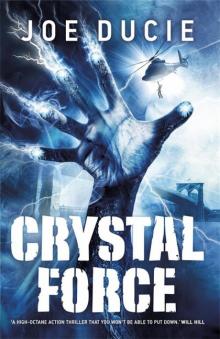 Crystal Force
Crystal Force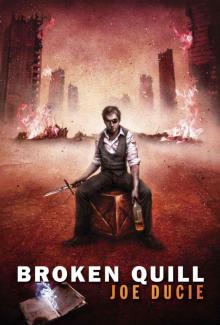 Broken Quill
Broken Quill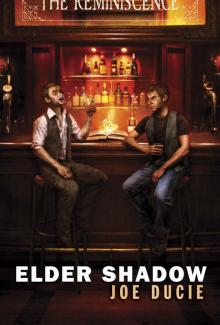 Elder Shadow (The Reminiscent Exile Book 5)
Elder Shadow (The Reminiscent Exile Book 5)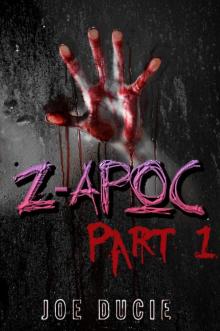 When John Met Sarah
When John Met Sarah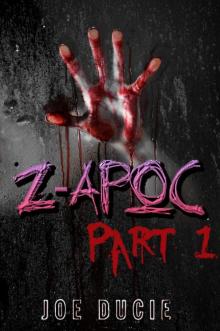 Z-APOC: When John Met Sarah
Z-APOC: When John Met Sarah![Broken Quill [2] Read online](http://i1.bookreadfree.com/i1/03/30/broken_quill_2_preview.jpg) Broken Quill [2]
Broken Quill [2]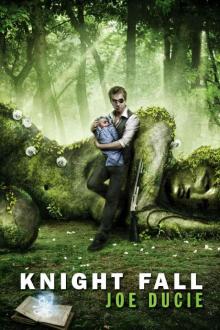 Knight Fall
Knight Fall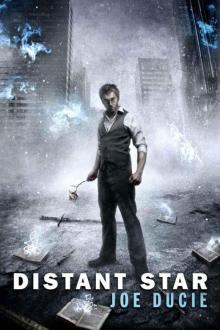 Distant Star
Distant Star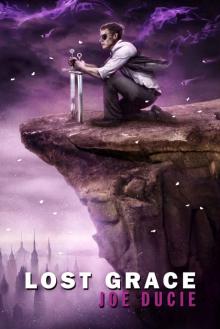 Lost Grace (The Reminiscent Exile Book 4)
Lost Grace (The Reminiscent Exile Book 4)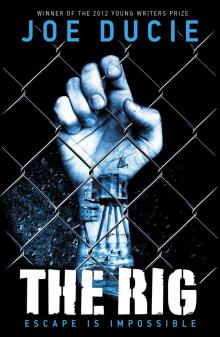 The Rig
The Rig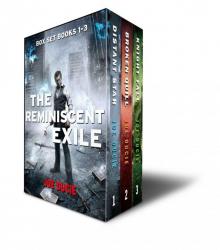 The Reminiscent Exile Series, Books 1-3: Distant Star, Broken Quill, Knight Fall
The Reminiscent Exile Series, Books 1-3: Distant Star, Broken Quill, Knight Fall